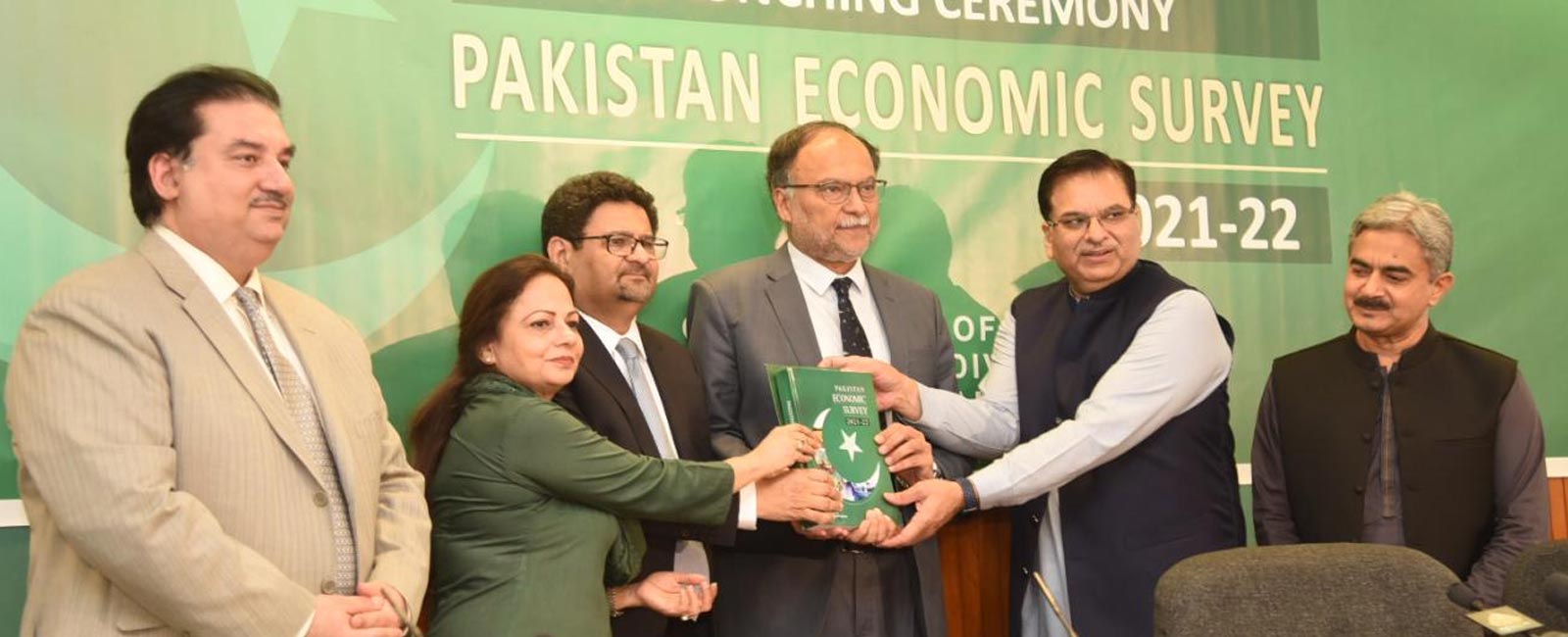'Economic growth still fragile': Experts weigh in on Economic Survey 2021-22
Geo.tv reaches out to economists who express concern saying growth witnessed during FY22 was "fragile", "unsustainable"

The coalition government unveiled the Economic Survey 2021-2022 on Thursday, which showed that Pakistan had beaten the envisaged target of 4.8% and recorded a growth of 6%.
This growth might look good on paper, but even as Minister for Planning, Development, and Special Initiatives Ahsan Iqbal was addressing a press conference following the survey's unveiling, he said that the percentage did not represent the "actual growth" as the economy had been rebased during the previous government's era.
When Geo.tv reached out to economic experts, they expressed similar concerns and said that the growth witnessed during the outgoing fiscal year was "fragile" and "unsustainable".
Vaqar Ahmed
The economic growth Pakistan has achieved is still "fragile" due to the external situation — rising oil prices and the uncertainty in the commodity markets due to the Russia-Ukraine war.
There are domestic issues, too, as there has been a change in the economic policy due to a change in the government. The second thing that the economic survey is telling us is that the balance of payments faces risks. Predominantly, the lack of foreign exchange reserves amid rising import payments, most notably oil, food, and raw materials, whose price is rising globally.
Read more: Pakistan Economic Survey 2021-22 at a glance
Pakistan has an import cover of less than two-and-a-half months and there is an urgent need for a further boost in foreign exchange reserves to repay external debt.
The economic survey has identified some risks with regard to the government budget and the fact that the government is unable to run high levels of subsidies. The budget deficit of the government has already increased, and the International Monetary Fund (IMF) has expressed concerns over that.
To trim that budget deficit, the government needs to take action on multiple fronts to revive the IMF programme and decrease the fiscal deficit.
These include decreasing the subsidies and moving towards target subsidies which should be directed towards the low-income segment.
Read more: Five key things to look out for in the budget tomorrow
Moreover, the development budget should be decreased because of resource constraints. The public sector development budget should be spent efficiently and carefully.
The survey also highlighted the need and the importance of consolidating these growth rates which we have made in the last year, particularly in sectors where growth can be seen, for example, textile, garment and some other export-oriented industries, as well as, construction and allied industries.
Vaqar Ahmed is the deputy executive director at Sustainable Development Policy Institute (SDPI). He has also served at UNDP as an adviser and has undertaken assignments with the Asian Development Bank, World Bank, and Ministries of Finance, and Planning.
Shahrukh Wani
The Pakistan Economic Survey 2021-22 showed what we have known for a while. It is possible to generate decent economic growth in Pakistan but it can't be sustained.
See more: Graphical overview of Pakistan's economic performance in FY22
Until the government fixes the structural imbalances in the economy, anytime economic growth exceeds 5%, the balance of payments will cause a macroeconomic crisis.
Shahrukh Wani is an economist at the University of Oxford.
Tahir Abbas
The economic survey showed higher than expected growth in the economy during FY22, leading to our core problem of running a high twin deficit. Moreover, with the mounting inflationary pressure in the next three to six months, the government is expected to slow down the economy with the focus remaining on broadening tax revenue, and curtailing expenditure while simultaneously taking care of its social spending on lower-income groups.
Tahir Abbas is the head of research at Arif Habib Limited.
Dr Abid Suleri
The 6% economic growth number is a good news and quite accurate reflection of our economy's first 10 months of the outgoing fiscal year 2021-22. However, the bad news is that despite this robust growth, country is in an economic mess today.
This is not the first time that Pakistan finds itself in an economic mess despite healthy growth. One may argue that economic growth of five-plus percentage points for 2-3 consecutive years ends up overheating Pakistan’s economy. Such overheating turns its current account deficit unsustainable, resulting in a boom and bust cycle.
To set the context right, we should remember that 95% of Pakistan’s growth is consumption-led, resulting in low savings and low investment-to-GDP ratio. 86% of consumption comes from households, making them highly vulnerable to any shock or reduced supply of resources.
And finally, more than 90% of Pakistan’s growth is imports based, increasing its current account deficit.
Dr Abid Suleri is a senior economist and is heading Pakistan's policy research think-tank, Sustainable Development Policy Institute (SDPI) since 2007.




